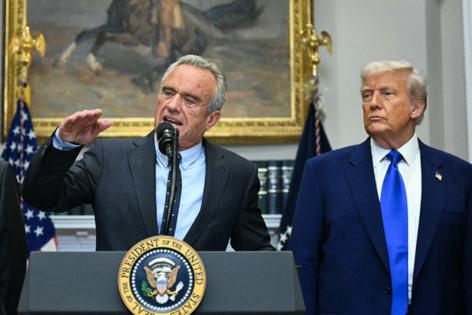Can Trump lower drug prices on his own? Experts weigh in after executive order
Published in Political News
President Donald Trump signed a sweeping executive order promising to dramatically and quickly cut the cost of drugs in the U.S.
But experts say Americans shouldn’t hold their breath, as they are skeptical about the order’s legality and ultimate impact.
“We are going to pay the lowest price there is in the world,” Trump said at a White House signing ceremony on May 12. “Some prescription drug and pharmaceutical prices will be reduced almost immediately by 50 to 80 to 90 percent.”
The order will push for U.S. consumers to pay no more for prescription drugs than the lowest price paid in other developed countries, known as the most-favored-nation price.
It gives Secretary of Health and Human Services Robert F. Kennedy Jr. 30 days to come up with new target prices and provide them to pharmaceutical manufacturers. If companies don’t comply, the order pledges “additional aggressive action,” which could include importing drugs directly from developed nations.
“Big pharma will either abide by this principle voluntarily or we’ll use the power of the federal government to ensure that we are paying the same price as other countries,” Trump said.
Can Trump cut prices on his own?
Health care and legal experts are doubtful about the order in part because they say the president lacks the authority to make these kinds of broad changes on his own.
“The president does not have the power under the Constitution to unilaterally lower drug prices,” Lawrence Gostin, the director of Georgetown University’s O’Neill Institute for National and Global Health Law, told McClatchy News.
That said, the president has been authorized by Congress to negotiate drug prices under Medicare, but not for those paid for with private insurance, he added.
Echoing this sentiment, Sidney Shapiro, a professor at Wake Forest University School of Law, told McClatchy News that “this administration is pretty inventful in claiming legal authority for things it really doesn’t have, and that’s why there have been so many court cases and injunctions stopping them from doing this or that.”
In order to actually bring down the cost of drugs in America — which, on average, are more than twice as high as those in other countries — lawmakers would need to step in.
“The use of anything resembling controls to cap prices — what using E.U. drug prices to set the price sounds like — would require Congress to act,” Barry Furrow, the director of the health law program at Drexel University School of Law, told McClatchy News.
And the likelihood of this happening is slim, he added.
“The current Congress would have little interest in price caps in any form — the whole idea is anathema to free market conservative Republicans,” Furrow said.
Voluntary action
The other reason experts are wary of major changes resulting from the order is that it relies on the elective cooperation of the pharmaceutical industry.
“It basically has to be voluntary on the behalf of the drug companies,” Frances Miller, an emeritus professor of health law at Boston University School of Law, told McClatchy News.
“Big pharma manufacturers are not babes in the woods,” she added. “They’re about the most powerful lobby country, and I don’t see them budging lightly.”
Further, the enforcement mechanisms outlined are vague and likely stand on weak ground, Burrow said.
For example, the order states that — if companies do not comply — RFK Jr. will issue “a rule-making plan” to force the industry to lower prices.
“In a world where federal agencies have lost significant power to regulate…this would be a tough move to make,” Burrow said, citing the Supreme Court’s 2024 overturning of the Chevron Doctrine, which required courts to give federal agencies broad latitude to interpret laws.
What comes next?
Experts believe the pharmaceutical industry will undoubtedly fight the order in court — though possibly not right away.
“There will certainly be legal challenges to the new Executive Order,” Gostin said, adding they will likely come “once the president’s ‘aggressive’ enforcement actions are known.”
“I don’t think there is enough content yet in the Trump order to even justify a legal challenge,” Furrow said. “If Trump fleshes this out, big Pharma would certainly go on the attack immediately, claiming that the sky is falling in.”
And, since Trump is acting on his own — without the cooperation of Congress — any lawsuits brought against the order will have a good chance of being successful, Gostin said.
But, while the administration’s methods may not be sound, the president is “certainly onto something,” Shapiro said.
Drug prices are “an issue the American people care a lot about,” he said. “The controversy has always been about how defensible these drug prices are in the United States.”
_____
©2025 The Charlotte Observer. Visit charlotteobserver.com. Distributed by Tribune Content Agency, LLC.




























































Comments